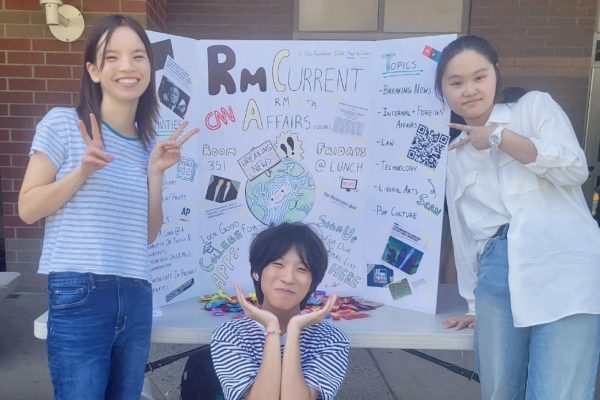Making, not breaking, resolutions
It can often be hard to keep New Year’s Resolutions, but a number of RM students have successfully kept them so far.
At the start of the new year, people across the nation set out to achieve their often ambitious New Year’s resolutions. However, 80 percent of people give up on their goals for the new year by mid-February, according to U.S. News & World Report. Despite this trend, many RM students have managed to stick with their resolutions so far.
Common student New Year’s resolutions include improving grades, boosting athletic performance, living a healthier lifestyle and impacting others. Sophomore Maegan Evans wants to focus on this fourth category because she feels that it is important to be considerate towards others. “One of my New Year’s resolutions is to be a better version of myself and be better to people in general. I want to treat people with respect and see the best in every person,” she said.
Evans plans on achieving her resolution by not jumping to conclusions and phrasing her words differently. “Instead of being mad with someone, I’ll just have love and show compassion and understanding for that person,” she said.
Similarly, health teacher John Fahrner’s resolution relates to positively affecting people’s lives. “I want to get to know as many students as I can and I want to be an impact player in their life. A teacher has to be a reacher and I’ve been reaching kids for 42 years,” Mr. Fahrner said.
In contrast, some RM students want to achieve more personal goals this year. “I want to be more committed in my sports and try to devote more time for that. I plan to do more vigorous workouts and bring my speed up so it can help me all around,” sophomore Kai Ghebrehiwet said.
Junior Elias Applebaum also seeks self-improvement by bettering his work habits and daily productivity. “I want to have more efficiency in life and be more pragmatic about the way I schedule things. I want to get things done faster, get more sleep this year and just be my best self,” Applebaum said.
Although it is fairly easy to set a New Year’s resolution, the hard part is actually sticking with it throughout the entire year. It takes a lot of motivation and tenacity to achieve a New Year’s resolution, which is why most people give up in the process. “I think if I have the support from my teammates, my coach and my family, it will definitely make it much easier,” Ghebrehiwet said.
According to Mr. Fahrner, a smart way to achieve a New Year’s resolution is by setting short-term goals. “If I have short-term goals that are in line with my lifetime goals, then it will all fit and make sense,” he said. Short-term goals help people achieve one thing at a time, which eventually leads to ultimate success.
Mr. Fahrner also draws motivation from his past successes with students. He believes that people need to come into a new year with a growth mindset. “It’s almost the secret of life. I begin with the end in mind,” he said.
There are many ways to achieve a New Year’s resolution, but what causes 80 percent of the population to give up anyway? According to Psychology Today, a common reason for failed resolutions is unrealistic expectations. People set the bar on themselves too high and abandon their goals when they realize they are not achievable within a certain time.
Applebaum believes that New Year’s resolutions are more achievable when people set goals according to what they want to do. “Don’t make your goal somebody else’s goal. Just go for whatever you want to do and whatever you feel is your calling,” Applebaum said.
Despite the many obstacles that come with achieving a New Year’s resolution, many RM students believe that anyone can accomplish their goals with the right mindset. “Don’t let anybody get in your head and tell you that you can’t do it because anything is possible and you just have to believe,” Evans said.
Your donation will support the student journalists of The Tide, Richard Montgomery High School's student newspaper. Your contribution will allow us to purchase equipment and cover our annual website hosting costs.

Natalie is excited to be a Centerspread editor for her second year in the row! In the past, she has written for the Centerspread and Features section of...










